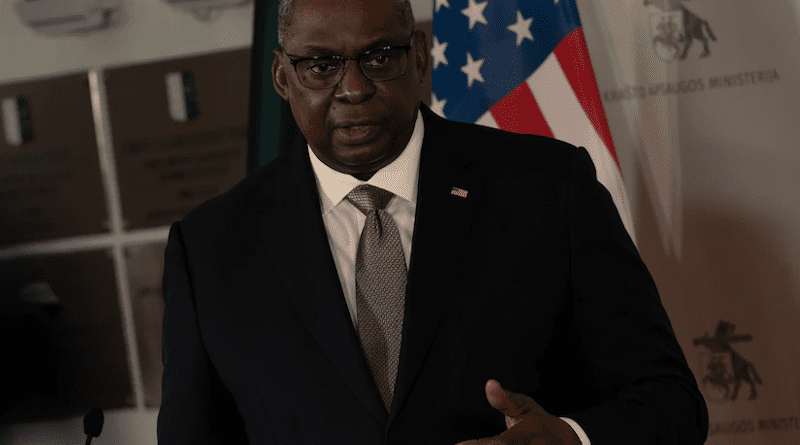US’ Austin Says Russian Forces ‘Uncoiling,’ Poised to Strike Ukraine
By DoD News
By Jim Garamone
Secretary of Defense Lloyd J. Austin III is visiting with the leaders of the frontline NATO states in Vilnius, Lithuania, the day after President Joe Biden told the American people that he believes Russian President Vladimir Putin has decided on war with Ukraine.
“As of this moment, I’m convinced he’s made the decision [to invade Ukraine],” President Biden said during a news conference. “We have reason to believe that.”
The president further said that he expects Russian forces to target Kyiv — Ukraine’s capital city and largest metropolitan area.
In Vilnius, Austin held bilateral talks with Lithuanian leaders including President Gitanas Nauseda, Prime Minister Ingrida Simonyte and acting Minister of National Defense Gabrielius Landsbergis.
During a news conference with Landsbergis at the Ministry of Defense, Austin spoke directly to the people of the region. “I want everyone in Lithuania, Estonia and Latvia to know — and I want President Putin in the Kremlin to know — that the United States stands with our allies,” he said. “As I made clear in Brussels this week, we take our obligations to NATO and to our allies seriously. Our commitment to Article 5 is ironclad.”
Austin said that Russia has been building its capabilities in and around Ukraine and in Belarus for months. Those forces “are uncoiling and are now poised to strike,” he said.
He noted that the United States has deployed a 4,000-soldier infantry brigade combat team from the 82nd Airborne Division to Poland. A Stryker squadron from the 2nd Cavalry has taken 1,000 U.S. soldiers to Romania. Another Stryker company is moving to Bulgaria and still another is deploying to Hungary.
On top of this, 8,500 U.S. service members are on heightened alert, should the North Atlantic Council activate the NATO Rapid Response Force.
And the United States is not alone. The NATO allies are solidly united against Russia’s actions. “Rather than sowing divisions among allies — which we know Mr. Putin would like to see — NATO has shored up its defense and deterrence posture,” Austin said. “Mr. Putin says he doesn’t want to see a strong NATO on his western flank. That’s exactly what he’s getting.”
Even at this late hour, war is not inevitable, Austin said, and Landsbergis agreed saying “we should leave a space at the table of diplomacy to those who want to be at that table. But if that seat at the table remains empty, we need to state clearly that we’re ready to defend ourselves.”
U.S. Secretary of State Anthony Blinken is scheduled to meet his Russian counterpart next week.
And Putin could close a different path. “The United States — in lockstep with our allies and partners — has offered him another opportunity to pursue a diplomatic solution,” the secretary said. “We hope that he takes it. We hope that he steps back from the brink of conflict. We hope he de-escalates.”
The Russian forces are uncoiling, the secretary said, and moving closer to the Ukrainian border. “That facilitates their onward movement,” he said.
The forces Putin has put in place — combat forces, logistics units, aviation, hospitals, command and control nodes and more — are the capabilities needed to strike. “Having done this before, I can tell you that that is exactly what you need to attack and the and the stance that you need to be in to attack,” the career soldier said in answer to a question.
Even then, it is not too late to choose peace. He noted that when he was a battalion commander in the 82nd Airborne Division in 1994, he and his unit was on an aircraft ready to jump into Haiti. “Somehow en-route, a diplomatic solution was reached, and we turned that operation around,” he said. “So, I believe that we should continue to try up until the very last minute.”
Still, no matter what Putin decides, the United States will stand with allies and partners, Austin said. “Together, we will work to overcome any challenge to European peace and stability.”
The United States has roughly 500 soldiers deployed in Lithuania on a rotational basis. Lithuanian leaders called for reinforcements considering Putin’s moves against Ukraine and would like to see the American presence in the country become permanent.
Landsbergis said Lithuania sees Putin trying to build on successes he had in 2008 when Russian troops wrested two provinces away from Georgia, and in 2014 when Russia occupied Crimea and destabilized eastern Ukraine. “We’re saying that the battle for Ukraine is a battle for Europe,” he said. “If [Putin is] not stopped there, he will go further. And so, we cannot let Putin have this success.”
Following the joint press conference, Austin met with Cabinet officials from Estonia, Latvia and Lithuania.

